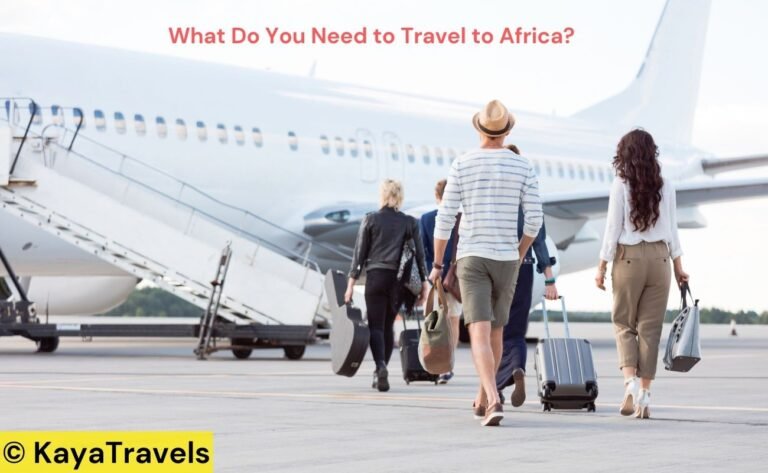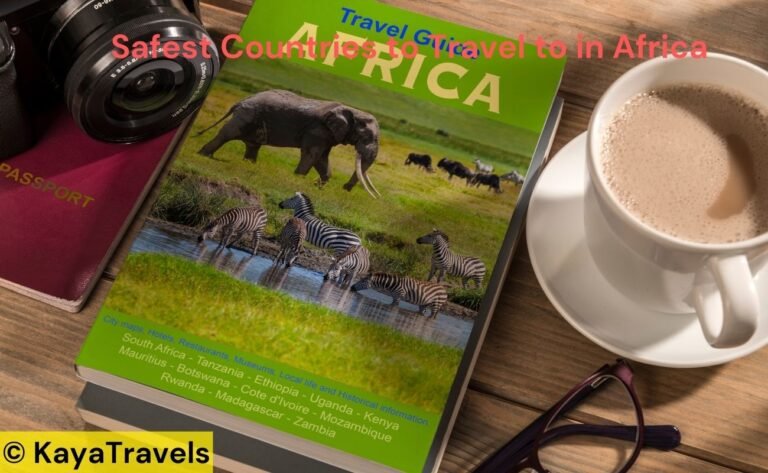Travelling to Africa requires careful planning, particularly regarding understanding visa requirements. The requirements for entering African countries can vary significantly depending on your nationality.
Most African nations require visitors to have a passport with at least six months of validity beyond their planned departure date from the country, and some may require visas in advance for entry.
Short-term visits, such as for tourism or business, often have streamlined visa processes or may not require a visa for stays up to a certain number of days. For instance, several countries offer visa-free travel for up to 90 days. However, if you plan to stay longer, the process can become more complex, possibly involving applications and interviews.
Before embarking on your journey, ensure you meet all the travel requirements for the country or countries you plan to visit in Africa. It’s vital to check the specific visa regulations for your destination well in advance as policy and procedures may change, and failing to comply with visa rules can disrupt your plans or lead to denial of entry.
General Visa Requirements for Africa
Before you plan your African adventure, it’s crucial to understand visa requirements. Visa policies vary widely across the continent and depend on your nationality, with countries like the U.S., UK, Canada, Australia, and E.U. member states often enjoying different agreements.
Understanding Visa Types
Different African countries offer various types of visas, such as tourist, business, transit, and, in some cases, visa-free entry for specific durations. For instance, an East Africa Tourist Visa allows travel between Kenya, Rwanda, and Uganda with the same document, simplifying regional exploration.
Standard Documentation for Visa Applications
To apply for a visa, you typically need:
- A valid passport: Your passport should have at least six months of validity beyond your planned departure date from Africa and at least two blank pages.
- Completed visa application form: Obtainable from the destination country’s embassy or government website.
- Passport photos: Generally, two recent photos meet the specific requirements of your destination country.
Remember, while visa policies are subject to change, checking the most current information before travel is always best. Visit official government websites or consult with embassies to ensure that your documentation is in order. Proper preparation can save you time and hassle, making for smooth sailing on your African journey.
Specific Visa Information by Country
When planning a journey to Africa, it’s essential to know that visa requirements can vastly differ from one country to another. This guide will provide specific details for key African nations and break down the visa options for Arrival and eVisas.
Visa Policies of Key African Nations
- South Africa: If you’re travelling from the USA, UK, Canada, Australia, or New Zealand, you will not need a visa for stays of up to 90 days. However, this could change, so please check before you travel.
- Kenya: For most nationalities, a visa must be applied for online in advance, and it costs approximately $50 for a 90-day stay.
- Egypt: Citizens from many countries can acquire a visa on Arrival or an eVisa before Arrival, valid for a maximum of 30 days.
- Morocco and Tunisia: These North African nations offer a visa exemption for travellers from various countries for stays of up to 90 days.
Yellow Fever Vaccination: Some countries, like Kenya and Uganda, require proof of yellow fever vaccination upon entry. Always check the latest health requirements.
Visa On Arrival and eVisa Options
Visa on Arrival:
- Tanzania: Obtainable at the airport for most travellers, but check current policies as they can change.
- Zimbabwe: Available at the airport or border crossing, but the cost can vary depending on nationality.
eVisa Options:
- Rwanda: You can apply for an eVisa before departure, which is convenient.
- Ethiopia: For many nations, eVisas are available and must be obtained before Arrival.
- Mauritius: Offers a visa exemption for many countries, but you can also apply for an eVisa if required.
Please verify with the official government or embassy websites, as visa policies can be subject to changes. Remember that some countries have reciprocal visa agreements, which might influence visa requirements and fees.
Health and Safety Requirements
When preparing for travel to Africa, being up-to-date with vaccinations and aware of the local laws and customs is crucial. Your health and safety are paramount.
Vaccinations and Medical Advice
Before travelling, consult a healthcare provider for recommended immunizations. This might include vaccines for hepatitis A and typhoid, which are common concerns.
- Yellow Fever: Required for many African countries. You must present a valid yellow fever certificate upon entry.
- Malaria: Prevalent in many regions. Use prophylaxis and mosquito repellent.
Always carry a copy of your prescriptions and vaccination certificates.
Local Laws and Customs
Understand and respect African countries’ diverse cultures, which vary significantly.
- Customs: Research your destination’s cultural norms to avoid offence.
- Local Laws: Stay informed about laws to prevent legal issues. Being a foreigner does not exempt you from following local regulations.
Adapting to local customs and laws is essential for a safe trip.
Travel Tips for Africa
When preparing for your trip to Africa, it’s essential to focus on the necessary travel documents and adhere to cultural norms to ensure an enriching experience.
Packing Essentials and Entry Advice
Before jetting off to African countries, double-check that your passport has at least two blank pages and is valid for at least six months after your planned departure date. Bear in mind that entry requirements vary per country, with some requiring a visa in advance while others offer a visa upon Arrival. It’s wise to carry a credit card and some cash to pay for visas or other fees.
Bullet points your packing list:
- Essentials: Travel documents, medication, sunscreen, insect repellent.
- Clothing: Lightweight, breathable fabrics, a hat, and comfortable walking shoes for safari destinations.
- Electronics: Charging adapters, camera equipment.
- Other: A multiple entry visa if you visit more than one country.
Ensure you have proof of onward travel; some countries may ask for it upon entry.
Cultural Etiquette and Making Memories
Show respect for the local customs by learning and observing cultural etiquette. Simple gestures like saying “hello” in the local language or dressing modestly can make a difference. Always be polite and patient when interacting, and show appreciation for any assistance or hospitality you receive.
To help make lasting memories, involve yourself in cultural exchange—purchase crafts from local markets, engage with guides to learn about sites, and keep a journal or take photos to encapsulate your experiences. Remember, the most valuable souvenirs from your trip will be the stories and memories you create.
Visa Considerations for Special Groups
When planning to travel to Africa, understanding visa requirements for special groups like business professionals and families with minors is critical. Each group may have different needs and paperwork requirements, so it’s essential to know the specifics of your situation.
Business and Tourist Visas
Business visas are essential if you’re visiting Africa for work-related purposes. On the other hand, tourist visas are meant for those traveling for leisure or visiting family and friends. U.S. citizens should check with the U.S. Department of State or the specific country’s consulate to understand the required documents and whether a single-entry or multiple-entry visa fits their needs.
- Critical points for business visas:
- The purpose of your visit is strictly business-related.
- You might need an invitation from a company based in the destination country.
- Business visas could have more stringent entry requirements than tourist visas.
- Critical points for tourist visas:
- Tourist visas typically have a shorter processing time.
- They are generally intended for a single visit for leisure.
Visas for Minors and Families
Travelling with children requires extra attention to visa requirements. Some African nations have specific rules in place for minors to prevent child trafficking. For example, when travelling to or through South Africa, parents may need to provide a full birth certificate for each child, along with passports.
- Critical considerations for families:
- Always verify if a visa is necessary for each child.
- Remember that visa applications for minors often require consent from both parents.
Remember, precise visa requirements vary by country, and the latest information for travellers from the United States or any other country can typically be found at the relevant embassy or governmental website. Ensure you prepare well in advance to ensure a smooth business and leisure travel trip.
Troubleshooting Common Visa Issues
When planning a journey to Africa, encountering visa issues can be frustrating. Knowing how to address these hurdles is essential for a smooth travel experience.
Dealing with Visa Delays and Rejections
If your visa application is delayed or rejected, first review your application for any errors or missing information that could have caused the issue. Simple mistakes like misspelt names or incorrect passport numbers can be a common reason for delays.
- Verify that you have complied with all the visa rules and included the correct fee.
- Double-check that your application form is complete and all supporting documents are attached.
- If the problem persists, contact a visa agency for professional advice.
Documentation is critical, so keep copies of all your communications with authorities, including emails and postal receipts. Sometimes, persistence is needed to get your application moving again.
Contacting Embassies and Consulates
For issues that can’t be rectified, contact the embassy or consulate of the country you plan to visit. In the case of South Africa, you’d reach out to the South African High Commission.
- Locate the contact information on the official embassy or consulate website.
- Prepare specific questions to make the most of your communication with them.
- Be aware that it may take time to get a response, so be patient but persistent.
Take note of any fines or additional fees that might be part of resolving your visa issues, and keep a record of these expenses. Remember, embassy and consulate staff are there to help, but they also follow strict guidelines, so your patience can go a long way.






